DUBAI: As countries continue to report rising numbers of the COVID-19 on a daily basis, more governments are setting up increasingly strict measures to control the virus’ spread.
Malls closed in the UAE, Saudi Arabia’s curfew ran its second night and in India new rules are expected after the government has come under fire for not doing enough.
Currently, the global number of cases has topped 400,000, with over 105,000 recoveries and more than 18,900 deaths.
Wednesday, March 25 (All times in GMT)
20:50 - Another 28 people in England have died after testing positive for coronavirus, bringing the total number of deaths to 414, the country's health service said on Wednesday.
The latest fatalities were aged between 47 and 93 and all except the 47-year-old had underlying health conditions, National Health Service England said in a statement.
20:40 - Turkey's death toll from the coronavirus increased by 15 to 59 on Wednesday, as the number of confirmed cases rose by 561 to 2,433, Health Minister Fahrettin Koca said.
He said on Twitter that 5,035 tests had been conducted in the last 24 hours, bringing the total number of tests carried out in Turkey to around 33,000.
20:30 - The UAE will carry out an extensive program to disinfect public facilities and transport including the Dubai Metro to prevent the spread of coronavirus.
The “national disinfection program” will take place over the weekend and will begin at 8:00p.m. on Thursday and end at 6:00a.m. on Sunday.
The movement of people and traffic will be restricted during this period, and public transport, including Dubai Metro, will close.
20:12 - The Arab coalition fighting to restore the internationally recognized government in Yemen said it supports United Nations Secretary-General Antonio Guterres’ call for a cease-fire to combat the the spread of coronavirus.
Spokesperson Col. Turki Al-Maliki, said the coalition is leading the efforts of UN Special Envoy to Yemen Martin Griffiths to implement the cease-fire, reduce escalation, take practical steps to build confidence between the two parties in humanitarian and economic issues, alleviate the suffering of the
Yemeni people and work hard to confront the risks and spread of the Covid-19 pandemic.
20:10 - Egypt reported 54 new cases of coronavirus, one death and 95 recoveries on Wednesday.
19:45 - Argentine cyclist Max Richeze has been released from a hospital in the United Arab Emirates, where the UAE Team Emirates rider spent 18 days after testing positive for the coronavirus following the cancellation of the UAE Tour.
19:17 - The World Trade Organization's chief said on Wednesday that projections show that the economic downturn and job losses caused by the coronavirus pandemic would be worse than the 2008 recession.
"Recent projections predict an economic downturn and job losses that are worse than the global financial crisis a dozen years ago," director-general Roberto Azevedo said in a video message posted on the Geneva-based body's website.
He said concrete forecasts are not yet available but its in-house economists expect "a very sharp decline in trade".
19:07 - The British parliament will shut down on Wednesday because of the coronavirus outbreak, with MPs sent home a week early for their Easter break.
"The House of Commons has agreed to adjourn for Easter recess and will next sit on 21 April 2020," the lower chamber announced on its Twitter page.
18:14 - Dubai Municipality announced the closure of men’s salons and women’s beauty centers for two weeks, subject to change, as “preventive measures to ensure the health and safety of the community.”
As part of its efforts in strengthening preventive measures to ensure the health and safety of the community, #DubaiMunicipality announces the closure of men's salons and women's beauty centres for two weeks, subject to change. We thank you all for your cooperation. pic.twitter.com/q3TL7ROtt2
— بلدية دبي | Dubai Municipality (@DMunicipality) March 25, 2020
17:35 - Britain's modelling for the spread of the coronavirus through the country is based on the assumption that many people would still need to go to work, England's chief medical officer said on Wednesday.
"The modelling we have done here ... was based on the idea that quite a lot of people would have to go to work," Chris Whitty said at a news conference alongside Prime Minister Boris Johnson.
17:30 - British Prime Minister Boris Johnson said on Wednesday that more than 400,000 people had volunteered to help the National Health Service (NHS) cope with the coronavirus crisis within 24 hours of a government appeal for volunteers.
"I also want to offer a special thank-you to everyone who has now volunteered to help the NHS," Johnson said during a news conference.
"When we launched the appeal last night we hoped to get 250,000 volunteers over a few days, but I can tell you that in just 24 hours, 405,000 people have responded to the call."
17:21 - The death toll from an outbreak of coronavirus in Italy has grown by 683 to 7,503, the Civil Protection Agency said on Wednesday, a decline in the daily tally of fatalities following a spike the day before.
On Tuesday 743 people died. That followed 602 deaths on Monday, 650 on Sunday and a record of 793 on Saturday -- the highest daily figure since the contagion came to light on Feb. 21.
The total number of confirmed cases in Italy rose to 74,386 from a previous 69,176, the Civil Protection Agency said.
17:01 - The Palestinians reported their first death from the coronavirus, a woman in her 60’s who lived in the Israeli-occupied West Bank.
“The woman had experienced symptoms and was later hospitalized” before succumbing to the illness, said Ibrahim Melhem, a spokesman for the Palestinian Authority, which has limited self-rule in the West Bank.
16:35 - The UK will have test kits available within days to be sent to households to establish whether people have contracted the new coronavirus and developed immunity, a health official said on Wednesday. FULL STORY.

16:30 - The UAE’s Ministry of the Interior referred 64 people who had been in contact with people confirmed to be infected with coronavirus to the Public Prosecution for Emergencies and Crises at the Federal Public Prosecution, for violating government measures and not following the procedures and instructions issued by health authorities to combat the spread of the coronavirus.
The UAE imposed home quarantine for 14 days and violations include fines and imprisonment.
16:25- Algeria has 38 new cases of coronavirus and two people have died from the illness, the health ministry said.
16:20 - Spain’s Deputy Prime Minister Carmen Calvo has tested positive for coronavirus, the government said in a statement.
16:00 - Jerusalem’s Church of the Holy Sepulchre, revered in Christian tradition as the site of Jesus’s crucifixion and burial, was closed on Wednesday as a precaution against the coronavirus.
The closure, initially for a week, followed a meeting between Israeli police and church leaders, said Wadie Abu Nassar, spokesperson of the Assembly of Catholic Ordinaries of the Holy Land, after the Israeli government announced tighter restrictions to curb the spread of the virus.
15:45 - Saudi Arabia's General Presidency for the Affairs of the Two Holy Mosques announced the closure of the third expansion of the Grand Mosque in Makkah over coronavirus fears.
15:30 - Tunisia reported a 50% jump in confirmed coronavirus cases to 173, the health minister said in televised statement.
15:10 - Sudan released 4,217 prisoners as a precaution against the spread of coronavirus, state news agency SUNA said.
15:05 - Syria records three new coronavirus cases that came from Iran.
14:55 - The International Monetary Fund and World Bank on Wednesday called for governments to put a hold on debt payments from the world's poorest nations so they can battle the coronavirus pandemic.
"The World Bank Group and the IMF believe it is imperative at this moment to provide a global sense of relief for developing countries as well as a strong signal to financial markets," the Washington-based development lenders said in a joint statement.
The move is directed at countries that qualify for the most generous aid from the "IDA" fund aimed at the "two-thirds of the world's population living in extreme poverty."
14:40 - The coronavirus pandemic is threatening the entire human race, the United Nations said Wednesday as it launched a humanitarian response that includes appeals for $2 billon for the world's poorest people.
"COVID-19 is threatening the whole of humanity - and the whole of humanity must fight back. Global action and solidarity are crucial. Individual country responses are not going to be enough," Secretary General Antonio Guterres said in announcing the initiative.
14:20 - Countries must protect people in detention from the COVID-19 pandemic by releasing vulnerable prisoners, the UN’s rights chief said on Wednesday.
“Covid-19 has begun to strike prisons, jails and immigration detention centers, as well as residential care homes and psychiatric hospitals, and risks rampaging through such institutions’ extremely vulnerable populations,” Michelle Bachelet said in a statement.
14:10 - The Palestinian government has ordered home Palestinian labourers in Israel and in Israeli settlements in the occupied West Bank, saying their jobs exposed them to risk of the coronavirus.
The edict, announced late on Tuesday by Palestinian Prime Minister Mohammad Shtayyeh, could effectively shut down Israel's construction industry, heavily reliant on Palestinian labor.

13:50 - Dubai has directed private sector companies to implement remote working systems for 80% of staff from now until April 9, the authority regulating business in the emirate said on Twitter on Wednesday.
Pharmacies, grocery stores, supermarkets and cooperative societies were excluded from the order, Dubai Economy said.
13:40 - Russian President Vladimir Putin has postponed a nationwide vote on proposed constitutional amendments that include a change that would allow him to seek another term in power.
Putin didn't set a new date for the plebiscite originally set for April 22, saying Wednesday that it would depend on how the new coronavirus pandemic develops.
He also announced during a televised address to the nation that the government doesn't want Russians except those working in essential sectors to come to work next week. He said that stores, pharmacies and banks will stay open.
“Health, life and safety of the people is an absolute priority for us,” Putin said.
Russian authorities reported 163 more virus cases in the country since the day before, bringing the national total to 658 on Wednesday. That marked a significantly bigger daily increase from previous days, when the number of new infections grew only by several dozens.
13:30 - The new coronavirus is unlikely to disappear in summer, the European Union agency for disease control said, in a stark warning that the epidemic could continue when temperatures rise unless measures to hamper it are applied.
The notice leaves little room for hopes that SARS-CoV-2, the name of the new virus, could behave as the other four coronaviruses which are endemic in human populations and are usually not detected in summer months.
13:05 – The UAE Health Ministry said the total number of people with coronavirus has reached 333 cases and the total number of recoveries is 52. The ministry also said it urges all people to stay at home and to not go out except for necessetites.
12:55 – Egyptian Minister of Information has said that the adherence to the curfew is necessary to prevent the spread of the coronavirus outbreak.
12:40 – Saudi Arabia's health ministry said it has recorded the second death in the Kingdom. It also reported that the number of coronavirus infections in the Kingdom has risen to 900 and the number of recoveries has reached 29.
12:05 – US Secretary of State Mike Pompeo has criticized Iran for expelling a team from Medecins Sans Frontieres, a global medical charity, which sent a mobile 50-bed hospital and team of medics to Isfahan to help hospital workers there handle the huge volume of cases.
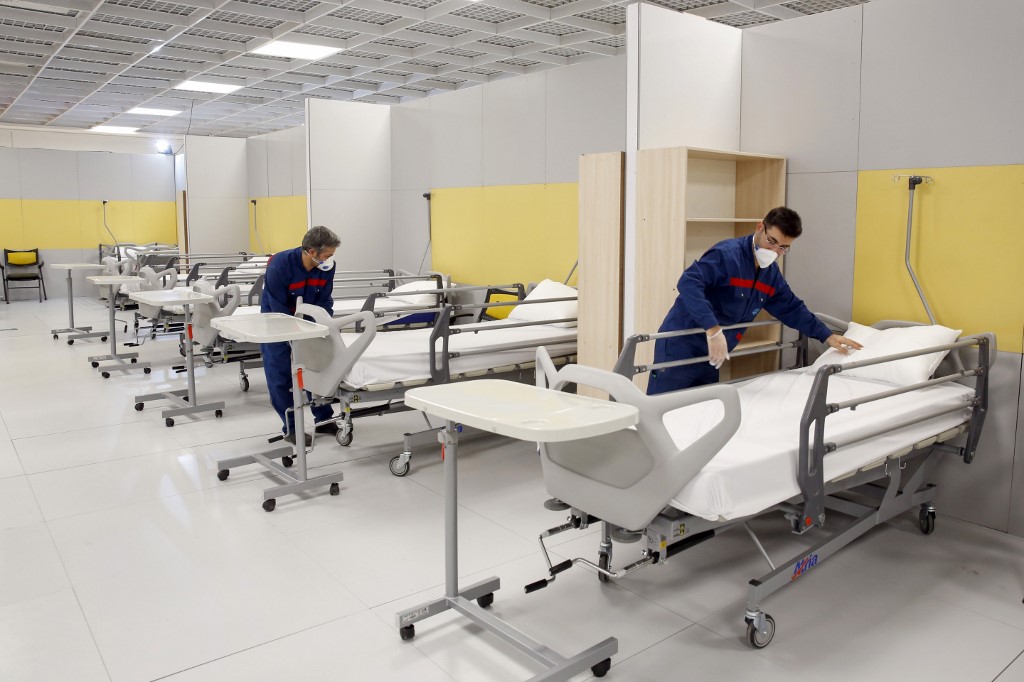
A total 2,077 people had died so far from the new coronavirus in Iran, with 143 deaths recorded in the past 24 hours. (AFP)
11:30 – The Moscow mayor has temporarily banned all public indoor and outdoor events, IFAX has reported.
11:25 – Qatar’s central bank has approved the postponement of loans’ installments for six months for some coronavirus-hit sectors. The monetary authority also cancelled fees on points of selling and ATM withdrawal fees.
11:00 – The Tokyo government said it has confirmed 121 cases of coronavirus infections in Tokyo. READ THE STORY
10:50 – Bahrain reported 13 new recoveries from coronavirus, total now at 190.
10:40 – Spain’s coronavirus death toll climbed to 3,434 from 2,696 on Tuesday, the country’s health ministry said. Coronavirus cases also rose to 47,610 from 39,673 from a day earlier.
10:40 – Prince Charles, the heir to the British throne, has tested positive for coronavirus, ITV reported.
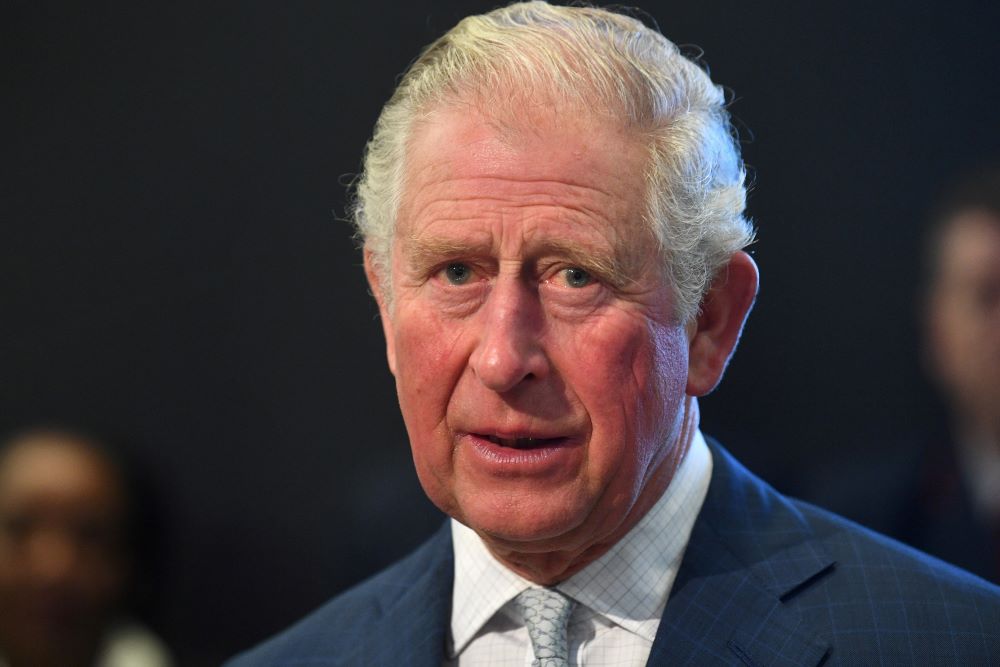
Prince Charles, the eldest son and heir to Queen Elizabeth II, has tested positive for the new coronavirus. (Reuters)
10:25 – Belgium recorded 56 new coronavirus deaths, bringing total to 178.
10:10 – King Salman has agreed to take further precautions to confront coronavirus; curfew to be implemented starting tomorrow in Riyadh, Mecca and Medina from 3:00p.m and there would be no entry or exit to and from the said areas during the period. Residents of the 13 Saudi regions will not be allowed to visit other regions.
10:00 – German Hospital Federation said there were around 1,000 coronavirus patients being treated in intensive care units in German clinics, and hospitals were treating up to 4,000 coronavirus patients currently.
09:50 – An Iranian health ministry official said on Wednesday that 2,077 people had died so far from the new coronavirus in Iran, with 143 deaths recorded in the past 24 hours. The total number of people infected with the coronavirus has climbed to 27,017, Alireza Vahabzadeh tweeted.
09:25 – All unnecessary services in Vietnam’s capital, Hanoi, have been ordered to shut down as part of measures to curb the spread of the coronavirus, the city’s ruling body said. Hanoi has also called on places of worship not to organise events with large numbers of people, and to limit public gatherings, the Hanoi People’s Committee said in a statement.
08:55 – Philippine Health Ministry reported 84 new coronavirus cases, bringing total to 636, and three new deaths, bringing total to 38.
08:50 – Iran’s president warned that his government was poised to introduce tough new measures against the coronavirus as the death toll from one of the world’s deadliest outbreaks neared 2,000.
08:45 – Some doctors combatting India’s coronavirus outbreak have been evicted from their homes by force, a medical association said, due to fears that they may be infected and spread the disease to neighbors.
08:35 – The number of coronavirus cases in Russia has surged to 658, with new daily cases at a record 163, the government's official coronavirus website showed on Wednesday.
An earlier report on one of Russia's coronavirus monitoring websites had said the number of total cases was 516.
08:10 – Kuwait’s Ministry of Health said that the Middle East region has recorded 29,000 cases of coronavirus and 9,456 recoveries. Kuwait also reported four new infections during the past 24 hours, coronavirus cases have risen to 195 and 717 individuals have been quarantined.
Corona virus (COVID - 19) update #KUNA #KUWAIT
(M.T) pic.twitter.com/tw6oRhMNAa— Kuwait News Agency - English Feed (@kuna_en) March 25, 2020
08:00 – In Oman, 15 new cases of coronavirus were recorded, bringing the total to 99.
07:55 – The head of the French Hospital Federation believes that the coronavirus death tally certainly higher than official French figures.
07:50 – US President Donald Trump has requested novel coronavirus test kits from South Korea, his counterpart Moon Jae-in said Wednesday, as Washington pushes for a quick reopening of the world’s biggest economy.
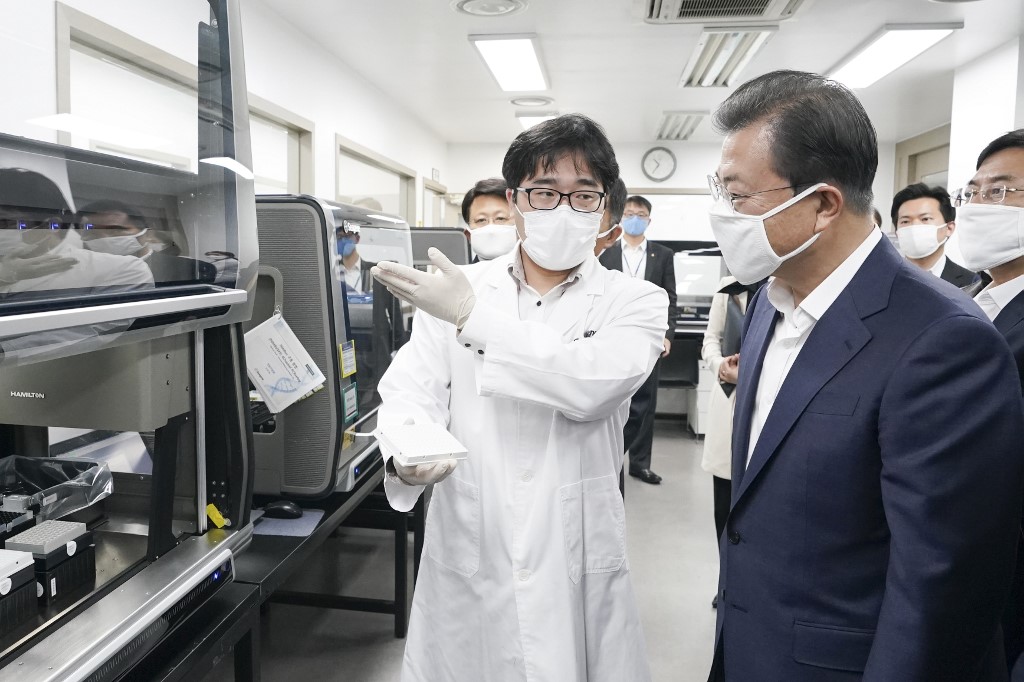
South Korean President Moon Jae-in, right, visits a Seegene research facility, a Seoul-based developer of COVID-19 diagnostic solutions, in Seoul on March 25, 2020. (AFP)
07:20 – Libya has reported its first case of the novel coronavirus, a particular source of concern in the North African country where civil war has badly degraded the public health care system. READ THE STORY
07:10 – Up to 158,000 people have signed up in the UK to the National Health Service volunteer scheme, ITV has reported.
07:05 – Coronavirus cases in Israel have risen to 2,030, officials said.
06:45 – The world’s largest democracy went under the world’s biggest lockdown Wednesday, with India’s 1.3 billion people ordered to stay home in a bid to stop the coronavirus pandemic.
India’s unprecedented move was aimed at keeping the virus from spreading and overwhelming its fragile health care system as it has done in parts of Europe, where infections were still surging.

06:25 – South Africa’s number of coronavirus cases has risen to 709, from 554 on Tuesday, health minister Zweli Mkhize said on Wednesday. “We are now at 709 cases,” he said, speaking on local news channel SABC.
06:20 – The White House and Senate leaders of both parties announced agreement early Wednesday on unprecedented emergency legislation to rush sweeping aid to businesses, workers and a health care system slammed by the coronavirus pandemic.
The urgently needed pandemic response measure is the largest economic rescue measure in history and is intended as a weeks- or months-long patch for an economy spiraling into recession and a nation facing a potentially ghastly toll.
06:10 – Pakistan halted all domestic passenger flights to stop the spread of the new coronavirus after reporting nearly 1,000 cases the country, just as Libya became the latest at-risk Middle East nation to report its first infection. READ THE STORY
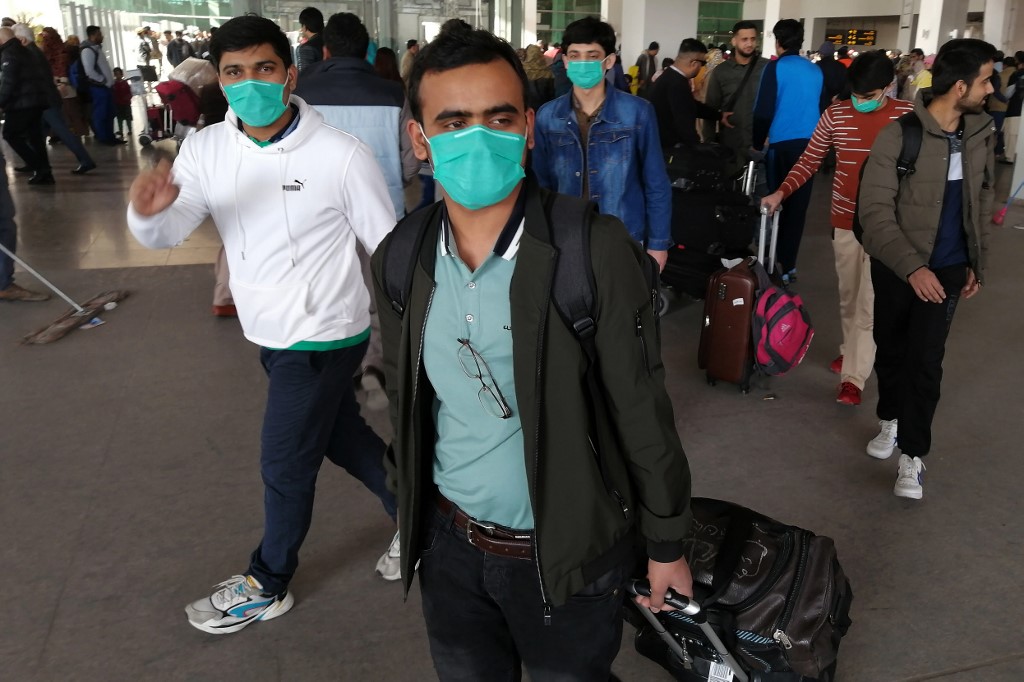
Pakistani students wear protective facemasks as they come out upon their arrival from China at the Islamabad International Airport on February 3, 2020. (AFP)
06:10 – Taiwan’s government announced 19 new coronavirus cases on Wednesday, all imported, bringing the total number of infected people on the island to 235. Taiwan also reported one extra case late on Tuesday, in addition to the 20 new cases it announced earlier that same day.
06:05 – Mainland China reported a drop in new confirmed coronavirus cases on Wednesday as imported infections fell and no locally transmitted infections were reported, including in central Hubei province, the epicentre of the outbreak in China. China is ramping up quarantine and screening rules for all international arrivals due to the risks from imported cases.
06:00 – The number of confirmed coronavirus cases in Germany rose to 31,554, and deaths to 149.
05:40 – Malaysia’s prime minister on Wednesday extended a two-week virtual lockdown to April 14 as coronavirus cases continue to rise in the country, which has the highest number of infections in Southeast Asia.
Muhyiddin Yassin said the country had 172 new coronavirus cases as of Wednesday noon, taking the total to 1796, with 17 deaths. The original restrictions were until March 31.
05:30 – The Kuwaiti minister of health said four people with coronavirus have recovered, the total recoveries now at 43.
04:15 – Thailand has recorded 107 new coronavirus cases, bringing total to 934, a health official said on Wednesday.
The new cases consist of 27 patients linked to previous cases, 13 new cases including imported ones, and 67 people who tested positive and are awaiting investigation into how they contracted the disease, Taweesin Wisanuyothin, a Public Health Ministry spokesman said. Thailand has recorded four death since the outbreak while 70 patients have recovered and gone home. 860 patients are still being treated in hospitals.
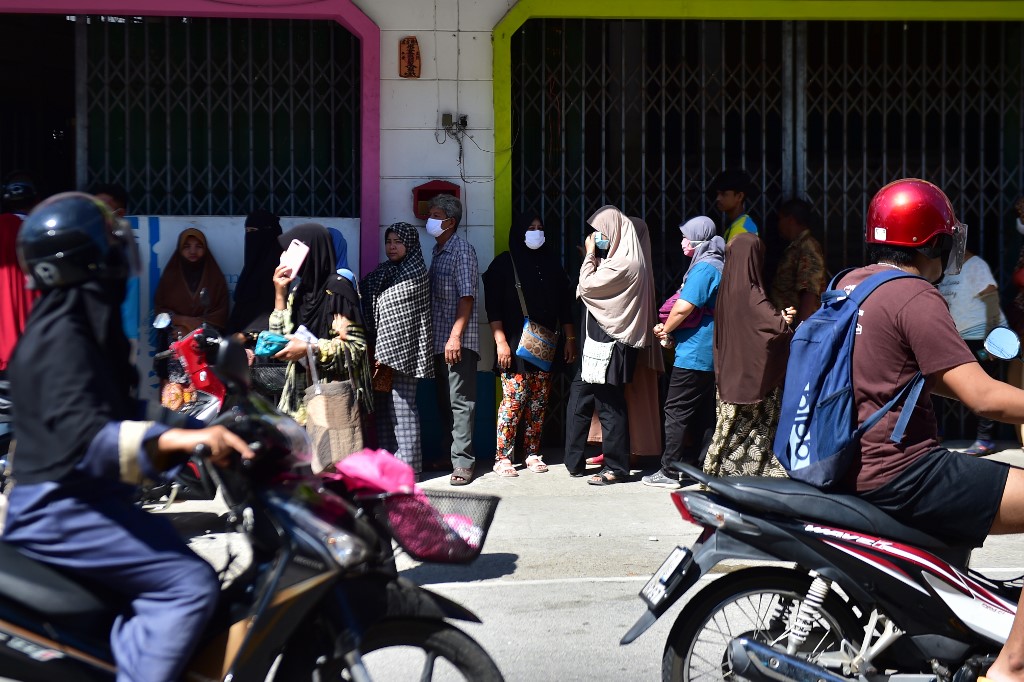
People wear face masks as preventive measure against the coronavirus as they queue to buy rice in Thailand's southern province of Narathiwat on March 25, 2020. (AFP)
02:45 – The death toll from coronavirus in Peru hit 7 after a 38-year-old man died after he contracted the disease while on a trip to Canada, the country’s Ministry of Health said.
The ministry said the man, who recently returned to Peru, died after being admitted to a Lima hospital on Monday for respiratory failure. He was found to be suffering from atypical pneumonia, it added.
Peru had confirmed 416 cases of the virus as of Tuesday.
02:25 – Walmart Inc’s Flipkart has suspended services, a notice on the Indian e-commerce firm’s website said on Wednesday, as India began a 21-day lockdown to fight the spread of the coronavirus pandemic.
Flipkart’s move came after rival Amazon India said on Tuesday it will halt orders for non-essential products in India to prioritize customers’ critical needs, and focus on supplying essentials.
Tuesday, March 24 (All times in GMT)
18:32 – Jordan confirmed 26 new coronavirus cases, bringing the total to 153.
Out of the new cases, 12 attended a wedding, 3 came from the UK, 9 were in contact with other cases, one Spanish national and one American.
17:33 – Algeria reported 34 new coronavirus cases and two deaths, increasing tolls to 264 patients and 19 deaths.
15:36 – The UAE’s Ministry of Health and Prevention recorded 50 new coronavirus cases and four recoveries. The country’s total infected to 248 and 45 recovered.
10:28 – The Kuwaiti Health Ministry decided to withdraw all medicines containing the anti-malarial drug hydroxychloroquine or chloroquine from private pharmacies and limit them to hospitals and health centers only, state news agency KUNA reported.


























